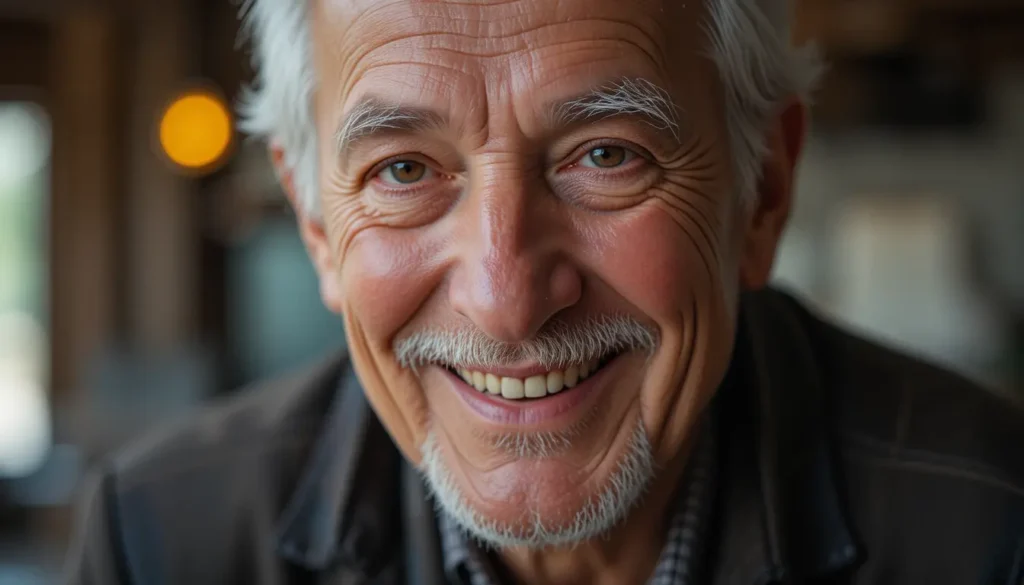Your heart changes after 60. The walls get thicker. Blood flow may slow down. But many people don’t notice until there’s a problem.
This isn’t a scare. It’s a wake-up call.
You can protect your heart. You can keep it strong. You can live longer with more energy.
But you must know what to do. This article gives you a clear plan.
Heart Healthy Habits
Your heart has worked hard for decades. By 60, the risk of heart disease is higher. Blood vessels may stiffen. Blood pressure may go up.
That’s not all. Many seniors take more medicines. Some have diabetes. Some gain weight. All of these add pressure on the heart.
But here’s the good part. Good habits still work. They work fast. And they don’t have to be hard.
The steps you take today can slow heart aging. They can prevent stroke, heart attack, or heart failure. You don’t need a gym. You don’t need a strict diet. You just need the right steps.
Coming up: the habits that protect your heart the most. Some may surprise you.
Habit 1: Walk Every Day
Walking is not just movement. It’s heart protection. Every step helps blood flow. Every step trains your heart to work better.
After 60, walking becomes a must, not a maybe. It keeps your joints loose. It keeps your lungs active. It keeps your muscles working. It keeps your heart strong.
You don’t need fancy shoes. You don’t need perfect weather. You don’t need a big plan. You just need to start.
Ten minutes is enough to begin. Do it once. Then do it again the next day. That’s how routines grow. That’s how your heart stays ready.
Don’t wait for motivation. Don’t wait for someone to join you. Make it your daily task. Just like brushing your teeth. No debate.
Walking once a week is not enough. Your heart forgets. It needs daily signals. It needs steady practice.
Missing one day is okay. Missing three is not. Your heart responds to habit, not effort. It likes slow, steady work.
Here’s the value: Walking helps lower blood pressure. It controls blood sugar. It burns calories. It supports sleep. It boosts mood. It reduces the chance of stroke and heart failure.
Pattern break: What if you have knee pain? Try water walking. Use a pool. The water supports your weight. Or walk in a shopping mall. Or around your home. Use a hallway. Walk in place during TV.
No excuse is stronger than your heart’s need. If you can stand, you can start.
Try walking in the morning to wake up the body. Or in the evening to relax the mind. Walk alone if needed. But it’s nice to walk with someone. It helps you keep going.
Use music. Use a timer. Count steps if you want. Or just enjoy the air and silence.
Make walking a non-negotiable habit. Set the time. Keep it short. Keep it doable.
Already walking? Go a little farther this week. Add 100 steps. Add 3 minutes. Go one house farther. That’s all.
Walking is free. It’s simple. It’s powerful. Your heart loves it. Give it what it needs. Every day.
Habit 2: Cut the Salt—But Not All the Flavor
Salt makes food taste better. But after 60, it comes with a cost. It raises blood pressure. High blood pressure damages the heart. Quietly. Slowly. Without warning.
Many seniors don’t notice how much salt they eat. That’s because taste buds lose strength over time. You stop tasting salt, so you add more. It becomes automatic.
It shows up in more than a salt shaker. Bread, soup, snacks, cheese, sauces—salt hides in plain sight. You eat more than you think.
The fix is simple. Retrain your taste. It takes about two weeks. Your body will notice the change before your tongue does.
Start now. Stop adding salt at the table. Taste the food first. You may not need it. If you cook, use less than the recipe says. If you buy food, check the label. “Low sodium” means 140 mg or less per serving. That’s your guide.
Frozen meals, canned soups, deli meats, and restaurant foods are salt traps. Be aware. You don’t need to ban them. Just eat them less.
Pattern break: Cutting salt doesn’t mean cutting flavor. Use herbs and spices. Use fresh garlic, onion, or chili. Use lemon juice, vinegar, or pepper. You don’t need bland food. You need smarter flavor.
Try one meal a day with no added salt. Give your tongue time to reset. After two weeks, salty foods may taste too strong.
The goal is not zero salt. The body needs some. The goal is control. Less than 1,500 mg a day is ideal for heart health after 60.
Cutting salt can drop your blood pressure within days. That means less strain on your heart. That means lower risk of stroke. That means fewer pills later.
No crash needed. No drama. Just a quiet shift. Small steps work. Small wins add up.
Taste will adjust. Cravings will change. Food will still taste good. Your body will thank you.
Your heart already knows what’s best. Now it’s your turn.
Habit 3: Sleep Like Your Heart Depends on It (Because It Does)
Sleep changes with age. It becomes lighter. It breaks more. You may wake up more times during the night. You may rise earlier in the morning. Many seniors think this is normal. But poor sleep is not harmless.
Your heart needs deep sleep. That’s when the body slows down. That’s when blood pressure drops. That’s when your heart does its repair work.
When sleep is short or broken, stress hormones go up. Blood pressure rises. The heart works harder when it should be resting. Over time, this adds up.
One bad night won’t harm you. But poor sleep every night is a real danger.
So how do you fix it?
Start with a sleep routine. Go to bed and wake up at the same time every day. Yes—even on weekends. This trains your body clock.
Turn off screens an hour before bed. The light from phones or TVs tricks your brain into staying awake. Use that hour for calm—reading, light music, warm tea, or quiet talk.
Keep your room dark, cool, and quiet. These simple changes help the body slow down. A cooler room signals it’s time to sleep.
Pattern break: Don’t fight the clock in bed. If you can’t sleep after 20 minutes, get up. Sit in a chair. Stretch your body. Read a small page. Don’t force it. Then return to bed when you feel drowsy.
Avoid caffeine after lunch. It stays in your system for hours. And avoid alcohol near bedtime. It may make you sleepy at first, but it cuts deep sleep later.
Be careful with long naps during the day. If you nap, keep it under 30 minutes. Nap early in the day, not near bedtime.
If you wake up often at night, keep a notepad next to your bed. Write down thoughts that keep you awake. Let them go until morning.
Good sleep is not laziness. It is your repair time. It helps your memory. It helps your mood. It helps your heart.
Sleep may seem passive. But your body is hard at work. Don’t steal that time from your heart. Give it the rest it needs.
Better sleep means lower risk of stroke, heart disease, and memory problems. It’s one of the easiest wins you can give your body—starting tonight.
Habit 4: Eat to Calm the Heart
You’ve heard it for years—“Eat healthy.” But that phrase means different things to different people. After 60, it means something simple: eat what helps your heart rest, not fight.
Your heart works all day. The food you choose can help it relax or force it to work harder. Food is not just fuel. It’s pressure or peace.
Here’s what eating for heart peace looks like:
- Eat more vegetables and fruit. They are full of fiber and nutrients.
- Eat more beans, nuts, and seeds. They support blood flow and control sugar.
- Eat more fish instead of red meat. Fish has fats that help your heart.
- Eat less fried food, sugar, and white bread. These raise your risk.
No long list. No food charts. No counting.
Simple enough?
Pattern break: You don’t need a diet. You need a routine. That’s the part most people miss.
Start small. A salad once a day is a win. A bowl of beans is a win. A switch from white bread to whole grain is a win. These small moves have a big effect.
You don’t need to remove everything bad right now. That backfires. Change one meal this week. Then do another next week. Let your taste and habits adjust together.
Don’t worry about being perfect. Aim for better.
Here’s what happens when you shift your plate: cholesterol goes down. Blood sugar goes down. Inflammation goes down. Weight may go down too. All of this makes the heart’s job easier.
You don’t need special foods or pricey items. Frozen vegetables work. Canned beans work. Just rinse the salt off. Simple food, cooked at home, wins every time.
Drink more water. Cut out sugary drinks. Add fiber slowly so your body gets used to it. Chew slowly. Eat at the table. These things matter.
Pattern break: Food is not just physical. It’s emotional. Don’t eat in front of stress. Don’t eat in front of the TV. Sit, eat, breathe.
Every meal is a choice. You don’t need to win every time. Just more times than not.
When your eating calms the heart, everything else improves. Your energy. Your sleep. Your strength.
You can do this without being hungry. You can do this without being perfect.
Your heart is ready for the change. Your plate is the starting point.
Habit 5: Protect Your Heart From Stress
Stress does not always shout. It whispers. It hides in small moments. It builds up over time without making noise.
After 60, stress can feel different. You may not feel panic. You may just feel tired. Or heavy. Or low. Or less excited about the day.
But inside, stress is still active. It raises blood pressure. It stiffens blood vessels. It makes the heart beat harder than it needs to. Over time, that wears the heart down.
You don’t need a crisis to feel stress. A quiet life can still carry pressure—money worries, health changes, or missing people who used to be close.
So how do you protect your heart?
Here’s what helps:
- Talk to someone every day. Even short talks reduce stress.
- Go outside. Sunlight and fresh air reset your mood.
- Try slow breathing for five minutes. In through the nose. Out through the mouth.
- Limit news, phones, and screens. They add noise to the brain.
- Laugh more. Watch something silly. Talk to someone who lifts your mood.
None of these take much time. But they shift your body from stress mode to calm mode.
Pattern break: You can’t erase all stress. And you don’t have to. You just need to shrink it. Take breaks when you feel tight. Say no to things that drain you. Choose peace over pressure.
Some seniors keep their stress inside. They don’t want to be a burden. But silence feeds stress. Speak up. Let others help.
Join a group. See friends in person when you can. Send a message when you can’t. People are medicine too.
Move your body. Walking or stretching lowers stress. So does cleaning, gardening, or putting on music.
Try short moments of quiet. Sit still. Close your eyes. Breathe. Let your thoughts slow down. This is not wasted time. This is healing time.
A calm mind helps a calm heart. And a calm heart lives longer, beats smoother, and feels stronger.
You deserve peace. Every day. Not just during breaks or holidays. All the time.
Protect your heart from stress—not by escaping life, but by learning to live it with less noise inside.
Habit 6: Keep a Healthy Weight—But Don’t Rush It
After 60, weight shifts. Muscle goes down. Fat goes up. The body moves slower. The belly gets bigger. It’s not your fault. It’s part of aging. But it still matters.
Extra weight adds pressure on your heart. It makes the heart pump harder. It raises the risk of diabetes, stroke, and joint pain. It can also cause shortness of breath and low energy.
Many seniors try to lose weight fast. That backfires. Crash diets don’t last. They take away muscle. That makes you weaker. Then weight comes back faster.
You don’t need to lose fast. You need to lose right.
Here’s the better path:
- Eat less sugar.
- Eat less white bread, rice, and pasta.
- Walk every day.
- Drink more water.
- Sleep well and rest.
Weigh yourself once a week. Not every day. Your weight can shift from water or food. Weekly checks show real change.
Half a pound per week is a good goal. That’s two pounds per month. Slow, steady, and safe.
Pattern break: Don’t focus only on pounds. Watch your belt. Are pants looser? That’s progress. Watch your energy. Can you walk farther? That’s progress too.
Measure your wins by movement, not just numbers.
You don’t need to be thin. You don’t need to match your past. You need to be light enough to move freely. To climb stairs without pain. To breathe without effort.
Try small food swaps. Whole grain instead of white. Nuts instead of chips. Water instead of juice. These changes add up over weeks.
Don’t skip meals. Eat regular meals with protein, fiber, and healthy fat. This keeps you full. It helps prevent overeating later.
Don’t eat late at night. Give your body time to rest and digest.
If you mess up one day, start fresh the next. No guilt. No drama.
Weight loss helps your heart relax. Less pressure. Less effort. Better health.
You don’t need speed. You need direction. One step at a time. Toward better weight. Toward better heart health.
Habit 7: Get Your Numbers Checked—Then Act
Your heart doesn’t always send warnings. You may feel fine while damage builds up inside. That’s why numbers matter.
You can’t see high blood pressure. You can’t feel high cholesterol. You won’t notice rising blood sugar right away. But your heart notices all of it.
Every person over 60 should know these five numbers:
- Blood pressure
- Cholesterol (total, LDL, HDL, triglycerides)
- Blood sugar (fasting or A1C)
- Weight
- Waist size
These numbers are not just data. They are your early alerts. They show what’s happening inside your body before symptoms begin.
Get them checked. Once a year is a good start. More often if your doctor says so.
Write them down. Keep a simple list. Use paper, a notebook, or a phone. Knowing your numbers helps you see change.
Pattern break: Don’t guess. Don’t avoid. Don’t fear the results. Facing them gives you control. You can’t fix what you ignore.
If your numbers are high, don’t panic. Don’t try to change everything at once. Just choose one habit today.
- Start walking.
- Cut back on salt.
- Eat more vegetables and fiber.
- Sleep better.
- Reduce sugar.
Then check again in three months. See what changed. Small steps can shift big numbers.
Your numbers are your roadmap. They tell you where to adjust. They tell you what’s working.
Ask your doctor to explain the results. Don’t just nod and forget. Ask questions. Get clear goals.
Some people avoid tests because they “don’t want bad news.” But the real danger is delay. The earlier you know, the more time you have to act.
Each better number means less risk. Each improvement lowers the load on your heart.
You don’t need to be perfect. You just need to move in the right direction.
That’s how real change happens—slowly, one number at a time.
Habit 8: Take Medicine Correctly—Not Just Regularly
If you take heart pills, blood pressure meds, or blood thinners, how you take them matters. Timing, food, and dosage all affect how well they work.
Taking medicine late can reduce its power. Taking it with the wrong food can make you dizzy or sick. Skipping a dose can undo days of progress.
Use a pill box. Sort pills by day and time. It helps prevent mistakes.
Set a timer on your phone. Or link pills to daily habits—after brushing your teeth or before breakfast.
Never stop a pill without help. Pattern break: If it gives you side effects, don’t just quit. Call your doctor. Ask if there’s a lower dose or another option.
Some people take too many pills. Some take ones they don’t need. Others forget why they take them at all.
You deserve clarity. Ask your doctor to review your full list. Bring all your meds to your next visit—even over-the-counter ones.
Ask what each pill does. Ask why it matters. Get a printout from your doctor or pharmacist.
Stick it on your fridge. Keep a copy in your wallet. Give one to a family member.
Medicine only works if you use it right. Guesswork is not a plan. Your heart deserves better.
One more thing—check expiration dates. Pills don’t last forever.
Taking the right pill, the right way, at the right time saves lives.
Habit 9: Avoid Sitting Too Long
Sitting feels easy. But too much sitting hurts your heart.
When you sit for long periods, blood flow slows down. Sugar in your blood can rise. Your muscles become weak and lazy. Your joints get stiff. You may feel short of breath when you stand.
This adds up. It makes your heart work harder. It raises the chance of heart disease and diabetes.
The fix is simple: stand up every 30 minutes. Stretch your arms above your head. March in place. Walk to the door and back.
Pattern break: Watching TV? Use commercial breaks to walk around. On the phone? Stand while you talk.
Little movements may seem small, but they add up. Each time you stand, your heart pumps more blood. Your body feels stronger.
You don’t need a gym membership. You don’t need special equipment. You just need to move more and sit less.
Set a timer if you forget. Or use an app that reminds you to stand.
Make moving a habit. Take every chance to stand, stretch, and walk.
Your heart will thank you. Your body will feel more alive.
Don’t let sitting steal your strength. Move whenever you can.
Habit 10: Stay Curious and Connected
Loneliness is more than sadness. It’s a hidden risk to your heart. Studies show that feeling alone raises the chance of heart disease and stroke.
Humans need connection. We need people to talk to. We need purpose. We need things to look forward to each day.
Stay curious. Keep learning. Try new hobbies. Call a friend. Join a class or club. Volunteer once a week. Help others. These actions feed your heart and your mind.
Pattern break: Don’t wait for invitations. Reach out first. Send a message. Make a call. Take the first step.
A busy mind and a full heart protect your actual heart. Isolation shrinks your world. Connection expands it.
When you feel part of something bigger, your heart beats stronger and steadier.
Connection lowers stress. It lifts your mood. It helps you stay active and engaged.
You are not alone. Your heart thrives when your life is full of people and purpose.
Reach out today. Your heart will thank you.
You are not too old to protect your heart. You are not too late.
Each habit above works. Each one helps. Together, they transform how your heart feels and functions.
Start today. Pick one habit. Then another. Go slow. Stay steady.
You’ve cared for others your whole life. Now it’s time to care for your heart.
Your next years can be stronger than your last. Your heart is ready.
Are you?




